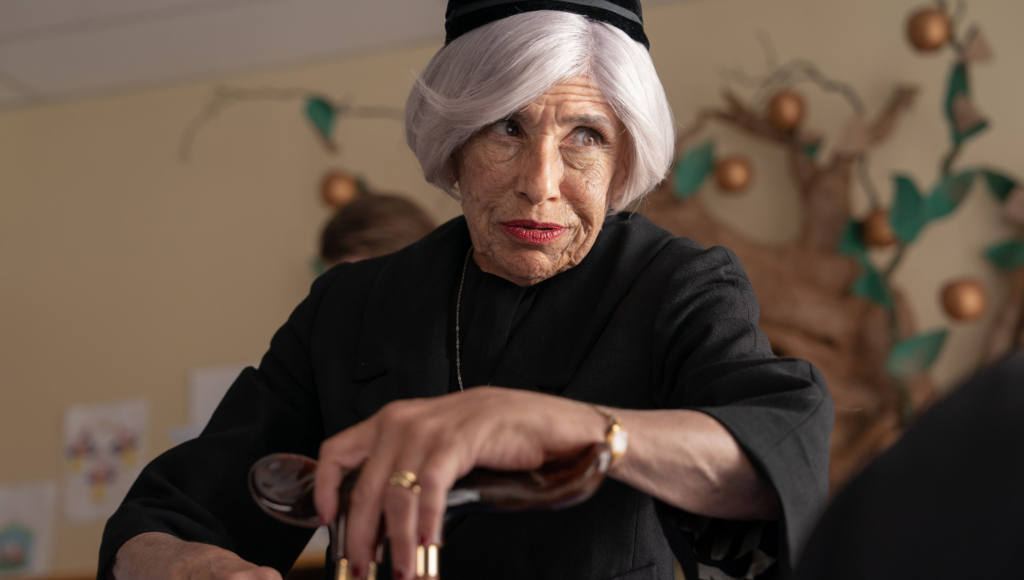Aging. There are so many idioms about the gracious value of getting older that it would seem that there should be a universal appreciation – a soft reverence – for those of an advanced age. But for the current generations hustling and bustling about on social media and around the world – of which yours truly can still count himself – there is an often unacknowledged fear of getting old. In Max and Sam Eggers’ The Front Room, a poorly but dastardly old woman with biases and extreme views of life unleashes a torrent of body horror, racism, and mind games on her step-son and his wife when she moves into their front room, with the result being the most amped-up, double dose of camp humor and psychological torture to hit theaters in a long time…and not in a good way.
Belinda (Brandy) is an adjunct professor of anthropology with a particular focus on the slow-evolving role of women in global development. Heavily pregnant and struggling for full-time employment and benefits to help prepare her for childbirth, Belinda quits her job to focus on getting her new home ready and to spend more time with Norman (Andrew Burnap), who is on the cusp of being made a partner at his law firm. Out of the blue, Norman receives word that his devoutly Christian father has died and that his stepmother Solange (Kathryn Hunter) has asked him and Belinda to come to the funeral. The news pushes Norman rather brashly to the point of anxiety; having kept his family history a secret from Belinda, he reveals to her that he hates Solange, her maternal conduct when he was growing up skirting the lines of abusive and cruel. At the funeral, Solange reveals to Norman that in her husband’s passing, she has sold everything – house and all – and has amended her will to leave every cent that is hers to Norman himself upon her death…under one condition: Norman and Belinda must take Solange in and help care for her in her final days. Knowing the vast sum they are set to inherit stacked against the mortgage of their new home, the cost of raising a new baby, and the fact that Belinda is no longer working, Belinda and Norman agree to take Solange into their home.
But it does not take long for friction, fighting, and feces to take center stage once Solange moves in; opinionated and domineering, Solange criticizes Belinda’s cooking, her family heritage, her profession, and the focus of her work being on ‘non-white’ women. Solange is a registered member of the United Daughters of the Confederacy to boot, all of which galls Belinda. Solange is also convinced that the Holy Spirit speaks to her directly and that through her very physical ‘communications’ with the Spirit, she can see what is meant to be and then insist on what the family must do to achieve that. But Solange starts making unsanitary messes constantly around the house, begins picking fights at dinner, openly belittling Belinda and saying her name wrong. Once Belinda gives birth, Solange’s behavior escalates… or is it elderly deterioration? Is it all malicious or just inadvertent? Was that a smile from the old woman or a glare? Sleep deprived, stressed, left to care for an infant and an elderly woman who may or may not be gaslighting her from a place of superiority – or even racism – Belinda’s ability to tell reality from nightmare blurs to the point where violence starts to look like the only answer to regain her home and sanity.
Yes, the story set up for the central conflict takes that long to set up, despite being summarily very straight forward. The scripting – and the overall story – are a series of tonal misalignments of ideas from other movies that do not work hand-in-hand in their current arrangement. The Eggers Brothers – related to fellow A24 horror darling Robert Eggers (The Witch, The Lighthouse) – seem to have struggled – and ultimately – failed to strike the balance of levity and horror they are striving for in exploring not only human aging, but in the aging and decaying of old philosophies and ideologies, instead landing squarely in ‘camp’ territory with generous flourishes of disgusting body horror laced up in extravagant progressive criticisms of old-fashioned – and certainly bigoted – people. Instead of Solange’s ‘nasty old crone’ being a long-suffering, misguided and bitter, frail, old woman with a few credible advantages to hold over Belinda and Norman to get care and attention, the Eggers Brothers have written an elderly caricature with outrageous flatulence (for laughs!) that also holds bizarre prayer sessions (for shock!) face down on the floor while approaching Belinda with every stereotype she can muster about Black Americans (for shame!) that were featured on 90s television shows…and then she defecates in her bed in high volume (for horror!). To make it worse, with all the tonal pin balling going on, the Eggers Brothers never seem to land on a motivation for Solange to unleash this barrage of terror on her own family – is it her bigoted ideas, or her need for a purpose in life to keep living? And why is she so fixated at times on trying to ‘mother’ Belinda’s newborn daughter? We never get anything close to answers; it is simply supposed to be enough that Solange is gross and crazy – evil – enough to make us fear her, even when there could be room for something more complex and humanistic in the setup.
Kathryn Hunter’s scenery devouring performance highlights the cruel perceptions of the horror of aging amidst a confused script with a progressive slant…and Brandy.
Thankfully, Kathryn Hunter is utterly fearless and then some in this, and she not only seems to revel in the absurdity of every gross-out or insane moment, but manages to find nuggets of something emotive in the scenes to make them watchable as audiences try to figure Solange out; she makes Solange feeble and meek when she needs help, portrays a perceived sincerity when trying to apologize (at first) for saying something crude or bigoted, but can also grimace and glare and cackle when she is covered in her own filth or trying to frame Belinda for an incident involving elderly harm. Hunter unabashedly takes glee in the elderly horror as much as the human pathos asked of her, but the film literally does not know what to do with such a force of an actress in this kind of insane roll. Audiences will be grossed out, amused, entertained, and shocked just enough to not disengage, and that is purely down to Hunter.

As as result – and truly through no fault of her own – headlining star Brandy does not know what to do with her Belinda. For every gonzo moment Hunter’s Solange provides, Belinda is not defined or motivated enough as a character to merit a truly resonant response. The script sets up what seems to be a story about Belinda owning her own life on her terms, from the failure at work, to her anxiety and grief over being a failed mother, as well as the added hardships due to her being both black and a woman. But with Solange embodying prejudices, anxieties, even her own cliches and stereotypes about the elderly and the religiously devout, Belinda seems to be stuck in a repetitive nightmare of simply wishing for it all to be over, being incensed over another revelation, and being left exhausted by it all. Brandy was never much of an actress in her musical heyday, but even she could emote more in a simple music video with clear direction and intent – The Front Room is missing all of that.
Frustratingly, there are flashes of something special here…perhaps we can call it the ‘Eggers Eye’…where there are moments – nightmares Belinda has in her exhausted state between caring for her infant daughter and trying to keep clear of the infantile Solange – where the most opulent and exact religious iconography is implemented to rouse an uncomfortable response. Many of these references fall back on the religious role of Mary, Christ’s mother, which given Belinda’s pregnancy and her grief over a lost child in her past, runs congruent to feelings of Mary’s possible guilt and sorrow over Jesus’s crucifixion. One such nightmare sees a delirious Belinda follow the sound of a crying baby only to find Norman, sprawled naked and hungrily breastfeeding in the lap of a fiendish Solange; as Norman finishes feeding, he lays back as if to sleep…but the camera pulls back enough to frame his limp body in Solange’s embrace, her expression now one of serenity, evoking Michelangelo’s Madonna della Pietá, or the Sixth Sorrow of Mary as she holds a dead Jesus fresh from the cross. The precision of the shots going from nightmare to divine symbol recalls Robert Eggers depiction of Poseidon by referencing Sascha Schneider’s painting Hypnosis in The Lighthouse. There is a moment where the shot in frame just jolts everything from emotion to understanding. But unlike Robert’s reference, Sam and Max fail to pay it off or come back to it as more than anything else but a clever Easter egg for cinephiles or art aficionados to point at to their friends.
The Eggers Brothers have a ways to go in emulating their older brother’s success, even if they share the ‘Eggers Eye’. A comprehensive story – a good script – is the basis of any successful film. Hopefully next time, they’ll use that ‘eye’ and start from there.
Final Thought
Part Rosemary’s Baby by way of Look Who’s Coming to Dinner, packaged in Whatever Happened to Baby Jane?, The Front Room is perhaps best described by Solange herself… “M-E-Double S. Mess.”

